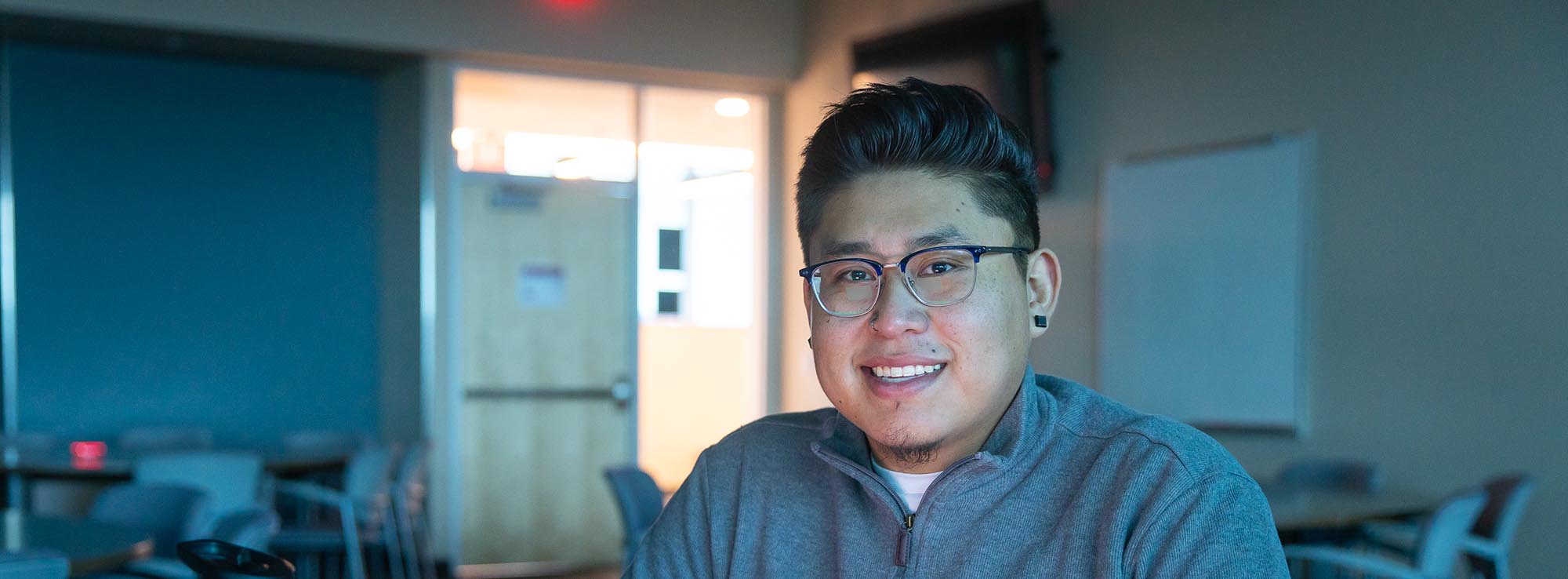As one of the few Navajo students enrolled at The University of New Mexico College of Population Health and a first-generation college student, Zachary Larry has overcome a lot of obstacles.
“It’s definitely great to see how far I’ve come,” he said.
Blossoming from a quiet, shy student into one who received several internship offers, which then helped him overcome his financial hurdles paying for college, Larry said he persevered, in a large part due to his Native American heritage.
“Being Navajo is a plus, in that aspect,” he said. “We are strong and resilient.”
As a member of the Navajo Nation, Larry said he hopes his pursuit of higher education will encourage other Native Americans to do the same.
“If I can do it, they can too,” he said. “There’s not that many Native Americans in health care. We been through so much throughout history, and I think other Native Americans seeing me or someone that looks like them gives them that sense of motivation to complete a higher degree.”
Knowing that he can only do so much as one person, Larry, who is currently in the final semester of the master of public health program in the College of Population Health, said it is important to continue his education so he can learn how to effectively improve the health and standard of living for minorities, including Native American populations.
It’s really important for me to improve the quality of life for communities across the state, the country, and even the entire world. Continuing my education puts me in that direction addressing these inequities people are facing.
“There’s so much that needs to be addressed, but there’s only one me,” he said. “It’s really important for me to improve the quality of life for communities across the state, the country and even the entire world. Continuing my education puts me in that direction addressing these inequities people are facing.”
One of Larry’s College of Population Health instructors, Sue Noell Stone, MPH, said Larry blossomed throughout his collegiate experience, having started his undergraduate degree as a reserved student.
“He continued to progress in our undergraduate program. During his Capstone class, I was kind of watching him because I wasn’t sure how he was going to do, but by the end, he did really well and he had a fantastic experience,” she said. “He’s grown so much and he’s really taken advantage of every opportunity he can.”
One of the focuses of Larry’s education included learning about the social determinants of health, which include economic and social conditions that influence overall health conditions.
“The College of Population Health helps me identify social determinants of health in different communities,” he said. “Throughout all of my college education, I learned so much about program planning, involving community advocacy collaboration and how to do research, which really set me up for my internships.”
While pursuing his undergraduate degree at UNM, from which he graduated in 2020, Larry interned at UNM Hospital, where he worked as a policy analyst. Last year, he was chosen for a second internship at the New Mexico Human Services Department (HSD), where he worked as a policy fellow, often assisting Cabinet Secretary David Scrase, MD.
“These internships allowed me to be at the forefront of policy,” he said. “I really liked researching the ways to improve the quality of health given to patients at UNM Hospital and identifying a set of innovative tools to address health inequities across the state. I was able to identify the social determinants of health that we learned about in class and how they impact achieving health equity.”
Larry said, as part of his internship with HSD, he was able to attend a variety of meetings and events across the state, such as the opening of a community health clinics in Gallup, where he was born.
“It’s really heartwarming, because there are a lot of people across the state who do not have access to primary care,” he said. “It’s important to address all these health disparities, especially by improving primary care for rural New Mexicans.”
Larry also works as a graduate assistant for Stone, assisting her with streamlining and developing courses.
“He’s someone I put a lot of trust in,” she said. “He’s become more of a colleague than a student, and I treasure his opinions about the work that we do. I’m going to miss him when he leaves, but I know he’ll go on to do good work.”
Going forward, Larry hopes to go straight into the workforce after graduating at the end of this semester – helping as many people as possible.
“I’m excited to see what’s next for me,” he said. “I know that these experiences I’ve had here will put me in a direction in something I’m really interested in pursuing.”

